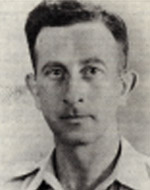Kertan, Michael (“Mitek”)
Son of Asher and Chase. He was born on July 27, 1916 in Warsaw, the capital of Poland. His family of veteran Warsaw residents; His brother, who fell in battle for the Warsaw ghetto, was one of its commanders. Michael graduated from high school in his hometown. He also studied at the School of Applied Arts. Showed a special inclination to caricature and even devoted himself to it at leisure. At the outbreak of the Second World War he put on his Polish uniform and fled across the border. In a detention camp in Hungary he received the news that his parents had perished in Warsaw. Then he fled from that camp and wandered through France to Syria, which was under French rule in those days. Where he joined the Polish army again. He participated in the battles of Libya and Tobruk and even won a medal for an important action against the Rommel army. A few weeks later, at the time of dismantling a landmine in the field, he was seriously injured in the head and taken to a hospital in Cairo. Finally, he came out of mortal danger, after a serious operation. Because of anti-Semitism in the Polish army, Michael saw no way but to defect. In 1944 he arrived in Tel Aviv and enlisted in the engineering corps of the British army. He was one of the last to be released from the British army and immediately joined the Haganah. During the War of Independence, he commanded a field company of the engineering corps, and especially excelled in various inventions for the establishment of mock camps. He specialized in leaving mines and dismantling them. After the War of Independence, he volunteered to blow up a dangerous mine in Jerusalem and received a special grade from Major General Ya’akov Dori, the first Chief of Staff, who served for many years with the paratroopers. He began to think about being released from the army, because he had said he would taste a civilian life, but he had asked for his release, but when he reached the time of his release he retracted his military action until on the 28th of Adar 5702 (February 28, 1955) Kissing the gates of Gaza. He was laid to rest in the military cemetery in Kiryat Shaul. He left a wife and two children. His memory was mentioned in Uri Milstein’s book, “The Paratroop Wars.”
